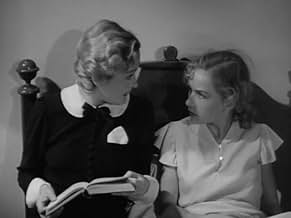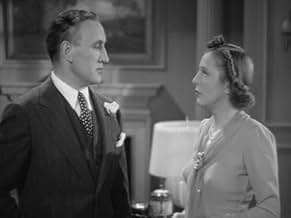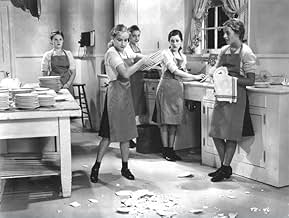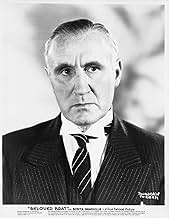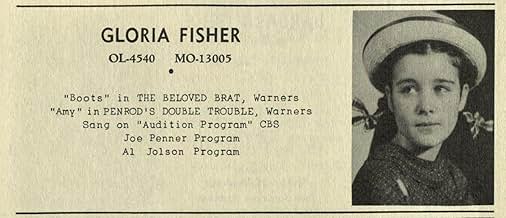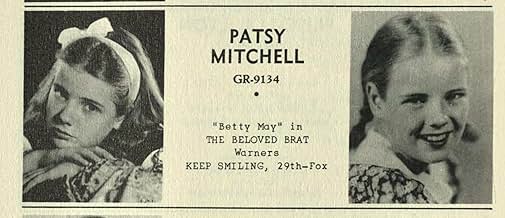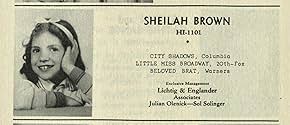Aggiungi una trama nella tua linguaDrama about a problem child and her problem parents.Drama about a problem child and her problem parents.Drama about a problem child and her problem parents.
- Regia
- Sceneggiatura
- Star
Lucile Gleason
- Miss Brewster
- (as Lucille Gleason)
Matthew 'Stymie' Beard
- Pinkie White
- (as Stymie Beard)
Gloria Fisher
- Boots
- (as Gloria Fischer)
Jessie Arnold
- Nurse
- (non citato nei titoli originali)
Mary Avery
- Teacher
- (non citato nei titoli originali)
Recensioni in evidenza
Beloved Brat, The (1938)
** 1/2 (out of 4)
Extremely bizarre and at times dark tale of rich girl Roberta (Bonita Granville) who hates the fact that her parents (Donald Crisp, Natalie Moorhead) think they can just give her money and nothing else when in fact she wants their attention and love. Roberta begins acting out and this leads to some tragic events, which finds her in a girl's school ran by a woman (Dolores Costello) who thinks she can reach her. THE BELOVED BRAT is one of the craziest movies I've seen from any of the major studios during this era. I can't say I completely understood what they were going for but I will admit that I've become a major fan of Granville over the past several years. Most people are going to remember her from the four Nancy Drew pictures made by Warner but she appeared in quite a few good films but for some reason her star never fully raised into a major career, which was a real shame. She has no problem playing the "brat" here. She's rather perfect in the role as she has no problems being mean when she has to and God knows she certainly knows how to throw a fit here. Just check out the scene where she pretty much beats up her butler after he throws her friend out of the house. She also manages to be quite believable when it comes time to show the more tender side of the character. Both Crisp and Moorhead are wasted in their thankless roles and even Costello doesn't show up until forty-minutes into the movie. Costello at least manages to be very charming in her part as is Matthew 'Stymie' Beard who plays the black friend who teaches Roberta how to shoot a gun. Leo Gorcey also appears in one scene. This is an incredibly dark movie at times with the subject matter going way past what most would consider a brat. There's several scenes where Roberta is quite abusive but even more disturbing are a few scenes where she's abused by the butler (Emmett Vogan). These scenes are extremely brutal when viewed today and there's even a scene where he repeatedly tells this 13-year-old girl to kill herself. I'm guessing this type of behavior was more acceptable back in the day but viewing it today makes one feel rather uneasy. There's even a scene where Gorcey pushes Granville into a river and she falls back and the scene shows her legs spread and her panties exposed. Considering the era I'm a little shocked that this here got past the censors or even that the studio didn't do a different take. With that said, the film has such a surreal feel to it that you can't help but be entertained and the 62-minute running time passes quite quickly. However, it's certainly Granville's show and she's the main reason to watch.
** 1/2 (out of 4)
Extremely bizarre and at times dark tale of rich girl Roberta (Bonita Granville) who hates the fact that her parents (Donald Crisp, Natalie Moorhead) think they can just give her money and nothing else when in fact she wants their attention and love. Roberta begins acting out and this leads to some tragic events, which finds her in a girl's school ran by a woman (Dolores Costello) who thinks she can reach her. THE BELOVED BRAT is one of the craziest movies I've seen from any of the major studios during this era. I can't say I completely understood what they were going for but I will admit that I've become a major fan of Granville over the past several years. Most people are going to remember her from the four Nancy Drew pictures made by Warner but she appeared in quite a few good films but for some reason her star never fully raised into a major career, which was a real shame. She has no problem playing the "brat" here. She's rather perfect in the role as she has no problems being mean when she has to and God knows she certainly knows how to throw a fit here. Just check out the scene where she pretty much beats up her butler after he throws her friend out of the house. She also manages to be quite believable when it comes time to show the more tender side of the character. Both Crisp and Moorhead are wasted in their thankless roles and even Costello doesn't show up until forty-minutes into the movie. Costello at least manages to be very charming in her part as is Matthew 'Stymie' Beard who plays the black friend who teaches Roberta how to shoot a gun. Leo Gorcey also appears in one scene. This is an incredibly dark movie at times with the subject matter going way past what most would consider a brat. There's several scenes where Roberta is quite abusive but even more disturbing are a few scenes where she's abused by the butler (Emmett Vogan). These scenes are extremely brutal when viewed today and there's even a scene where he repeatedly tells this 13-year-old girl to kill herself. I'm guessing this type of behavior was more acceptable back in the day but viewing it today makes one feel rather uneasy. There's even a scene where Gorcey pushes Granville into a river and she falls back and the scene shows her legs spread and her panties exposed. Considering the era I'm a little shocked that this here got past the censors or even that the studio didn't do a different take. With that said, the film has such a surreal feel to it that you can't help but be entertained and the 62-minute running time passes quite quickly. However, it's certainly Granville's show and she's the main reason to watch.
Warner Bros. was known for gritty gangster pictures. Here, of all things, they've fashioned a gritty adolescent girl film, with a lot more boldness than I ever expected. More than a brat, Roberta's a little hellion, flinging food trays and emotional tizzies at the slightest provocation. We understand her problems come from an unloving wealthy household where she and the butler (Vogan) go ten-rounds without a referee.
But consider the darker side. She is, after all, partially responsible for the death of an innocent motorist, when she grabs the car wheel from butler Jenkins. The probation school reckoning for that strikes me as pretty mild. Nor, rather surprisingly, does the screenplay supply a moral reckoning. Also unexpected is the casualness with which Roberta crosses the colorline with Pinkie (Beard) and his Negro family. But then, she probably identifies more with them than with her distant mother and father. And I agree with another reviewer that there seems some innuendo from the handsome Williams toward the budding young woman.
All of this strikes me as unusual for a Production Code programmer. But then writer Negulesco directed some of the better studio products of the 40's and 50's, including the soulful Deep Valley (1947) and the surprisingly sensitive Take Care of My Little Girl (1952). Then too, Granville turns in an absolutely bravura performance that rivets attention throughout. Quite a risk for a young actress to make herself so unlikable for so much of the movie. Anyhow, the last third lapses into something much more conventional, as might be expected for what remains a commercial product. Nonetheless, there's enough of the unconventional in both filming and writing to make this little obscurity worth catching up with.
But consider the darker side. She is, after all, partially responsible for the death of an innocent motorist, when she grabs the car wheel from butler Jenkins. The probation school reckoning for that strikes me as pretty mild. Nor, rather surprisingly, does the screenplay supply a moral reckoning. Also unexpected is the casualness with which Roberta crosses the colorline with Pinkie (Beard) and his Negro family. But then, she probably identifies more with them than with her distant mother and father. And I agree with another reviewer that there seems some innuendo from the handsome Williams toward the budding young woman.
All of this strikes me as unusual for a Production Code programmer. But then writer Negulesco directed some of the better studio products of the 40's and 50's, including the soulful Deep Valley (1947) and the surprisingly sensitive Take Care of My Little Girl (1952). Then too, Granville turns in an absolutely bravura performance that rivets attention throughout. Quite a risk for a young actress to make herself so unlikable for so much of the movie. Anyhow, the last third lapses into something much more conventional, as might be expected for what remains a commercial product. Nonetheless, there's enough of the unconventional in both filming and writing to make this little obscurity worth catching up with.
In the title role, Bonita Granville appears about as lovable as she'd been two years earlier in "These Three." A brat: Yes. Beloved? Not really. Not by the audience and not by her family.
She gets into mischief of an increasingly serious nature. Her self-involved wealthy parents are given the option of sending her to a school that seems to be a step above reform school.
The luminous Dolores Costello is employed there. Oh, who can forget her heartbreaking performance a few years later in "The Magnificent Ambersons"? She's very good here too.
All the acting is at least decent and often more than that.
From the beginning we see that Granville's character is the monster she is because no one -- not even her parents' servants -- likes or pays real attention to her. It's far from a great movie but it's also better than one would expect.
She gets into mischief of an increasingly serious nature. Her self-involved wealthy parents are given the option of sending her to a school that seems to be a step above reform school.
The luminous Dolores Costello is employed there. Oh, who can forget her heartbreaking performance a few years later in "The Magnificent Ambersons"? She's very good here too.
All the acting is at least decent and often more than that.
From the beginning we see that Granville's character is the monster she is because no one -- not even her parents' servants -- likes or pays real attention to her. It's far from a great movie but it's also better than one would expect.
A parental neglect social statement that comes dangerously close to the unintentional hilarity of "Reefer Madness". Fortunately it is saved by an extremely strong performance by Bonita Granville in the lead role (Roberta Morgan). While a bit of a reprise of her "These Three" nastiness, Granville's "The Beloved Brat" (1938) title role has considerably more dimensionality and the young actress displays unexpected range.
Granville was generally more cute than sexy, but this film has a pre-code feel to it and emphasizes her sensual side in several scenes. Donald Briggs of the pencil thin mustache plays her father's male secretary and they have a couple curious scenes together. These are certainly more interesting than his mildly romantic scenes with Dolores Costello who plays school principal Helen Morgan.
While the film might be of some interest to those focused on "Blacks in Hollywood", this is an extremely minor element within the film, artificially inserted just to lamely expand the "becoming a better person" theme.
Despite mostly weak supporting performances, Granville manages to sell her character and keeps a very unoriginal story quite involving. Fortunately she is in almost every scene. A must see for her fans.
Then again, what do I know? I'm only an inner child.
Granville was generally more cute than sexy, but this film has a pre-code feel to it and emphasizes her sensual side in several scenes. Donald Briggs of the pencil thin mustache plays her father's male secretary and they have a couple curious scenes together. These are certainly more interesting than his mildly romantic scenes with Dolores Costello who plays school principal Helen Morgan.
While the film might be of some interest to those focused on "Blacks in Hollywood", this is an extremely minor element within the film, artificially inserted just to lamely expand the "becoming a better person" theme.
Despite mostly weak supporting performances, Granville manages to sell her character and keeps a very unoriginal story quite involving. Fortunately she is in almost every scene. A must see for her fans.
Then again, what do I know? I'm only an inner child.
BONITA GRANVILLE specialized in playing brattish kid sister roles throughout most of the '30s (when she wasn't playing Nancy Drew), and this is one of her more insufferable roles as a rich brat given to tossing dinner trays out the window when in a huff.
She plays the neglected daughter of DONALD CRISP, only instead of pouting the way Shirley Temple would do under these "dire" circumstances, Bonita takes a feistier approach, talking back to the house servants and refusing to eat her spinach with much more vehemence than Shirley ever showed.
She befriends a black boy, only because he promises to teach her how to use his rifle. LEO GORCEY turns up as another unlikely companion for the poor little rich girl and from then on the film becomes pretty unwatchable as Bonita is taught a thing or two about changing her snobbish ways.
By the time the plot gets any thicker, Bonita has totally lost the patience of her parents as well as the viewer. Too bad Warner Bros. couldn't come up with better scripts for their child star instead of casting her in these insipid programmers that are enough to wear anyone's patience.
Any resemblance to the real world is purely coincidental.
Trivia note: The script was written by Jean Negulesco, who later made a much better director than screenwriter.
She plays the neglected daughter of DONALD CRISP, only instead of pouting the way Shirley Temple would do under these "dire" circumstances, Bonita takes a feistier approach, talking back to the house servants and refusing to eat her spinach with much more vehemence than Shirley ever showed.
She befriends a black boy, only because he promises to teach her how to use his rifle. LEO GORCEY turns up as another unlikely companion for the poor little rich girl and from then on the film becomes pretty unwatchable as Bonita is taught a thing or two about changing her snobbish ways.
By the time the plot gets any thicker, Bonita has totally lost the patience of her parents as well as the viewer. Too bad Warner Bros. couldn't come up with better scripts for their child star instead of casting her in these insipid programmers that are enough to wear anyone's patience.
Any resemblance to the real world is purely coincidental.
Trivia note: The script was written by Jean Negulesco, who later made a much better director than screenwriter.
Lo sapevi?
- QuizThe $50 Roberta receives from her father as a birthday present would equate to over $900 in 2019.
- BlooperIn two consecutive scenes between Donald Briggs and Dolores Costello, one interior and then exterior, first the shadow of the mike and then the mike and boom can be seen.
- ConnessioniFeatured in Jack Wrather: A Legacy of Film and Friendship (2022)
I più visti
Accedi per valutare e creare un elenco di titoli salvati per ottenere consigli personalizzati
Dettagli
- Data di uscita
- Paese di origine
- Lingue
- Celebre anche come
- Girls on Probation
- Luoghi delle riprese
- Aziende produttrici
- Vedi altri crediti dell’azienda su IMDbPro
- Tempo di esecuzione1 ora 2 minuti
- Colore
- Mix di suoni
- Proporzioni
- 1.37 : 1
Contribuisci a questa pagina
Suggerisci una modifica o aggiungi i contenuti mancanti

Divario superiore
By what name was The Beloved Brat (1938) officially released in Canada in English?
Rispondi
